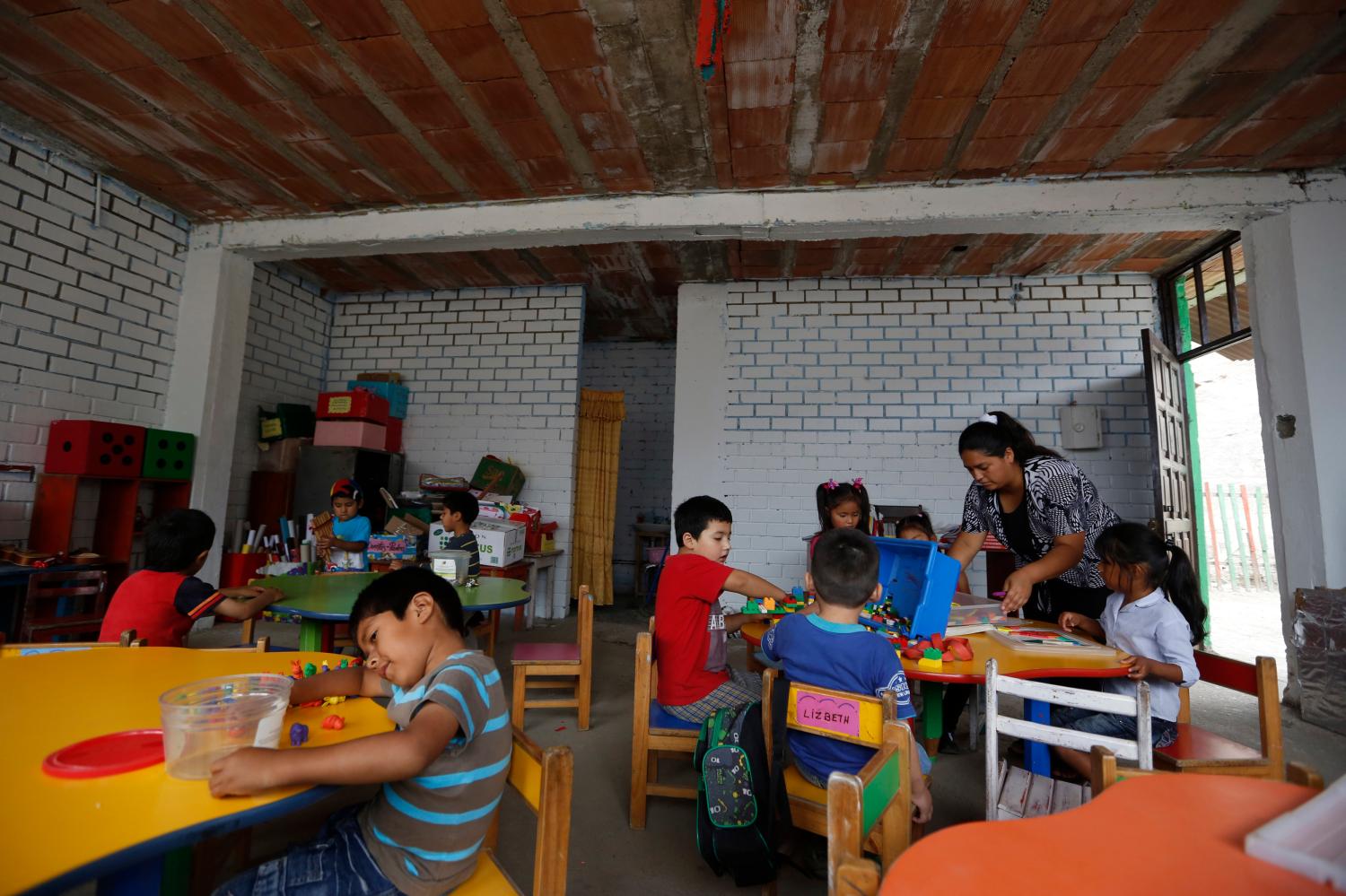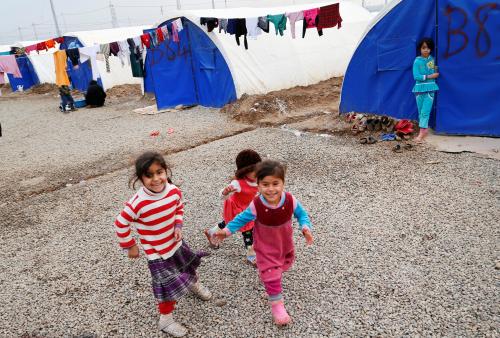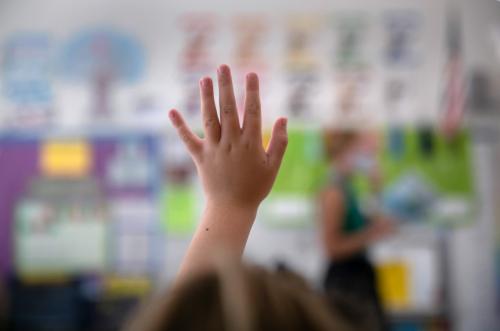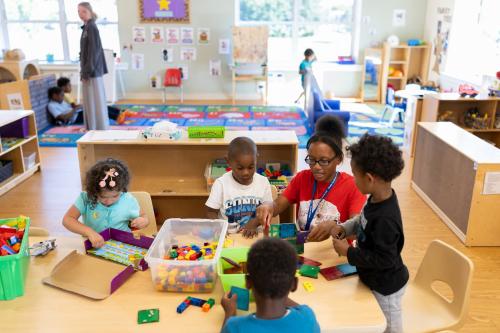This report represents the collaborative work of the Measuring Early Learning Quality and Outcomes (MELQO) core team, technical advisory groups and steering committee, as well as the individuals and organizations consulted in countries where the modules were piloted.
The MELQO Core Team included Abbie Raikes (Technical Lead), Sobhi Tawil, Mariana Kitsiona, Amanda Devercelli, Lucy Bassett, Kate Anderson, Tamar Manuelyan Atinc, Fabiola Lara, Pia Britto, and Ana Nieto.
In 2015, Member States of the United Nations agreed upon an ambitious set of global Sustainable Development Goals (SDGs). For the first time, early learning and development is featured in the global development agenda via SDG Target 4.2, which calls upon Member States to ensure, by the year 2030, ‘that all girls and boys have access to quality early childhood development, care and pre-primary education so that they are ready for primary education’ (UN, 2015). With this target comes a call to action for the early childhood education community to improve the quality, feasibility and accessibility of population-based measures of early childhood environments and learning outcomes associated with readiness for primary education.
The Measuring Early Learning Quality and Outcomes (MELQO) initiative began in 2014 in anticipation of this new global emphasis on early childhood development (ECD). Led by UNESCO, the World Bank, the Center for Universal Education at the Brookings Institution and UNICEF, the initiative aims to promote feasible, accurate and useful measurement of children’s development and learning at the start of primary school, and of the quality of their pre-primary learning environments. Items are designed for children between the ages of 4 and 6 years. Following the premise that many existing tools include similar items, the leading organizations’ core team worked with a consortium of experts, non-governmental organizations (NGOs) and multilaterals to build upon current measurement tools to create a common set of items organized into modules for measuring: 1) early childhood development and learning, and 2) the quality of pre-primary learning environments. The MELQO core team and experts also collaborated to outline a process for context-specific adaptation of the measurement modules resulting from lessons learned from field-testing in several countries in 2015 and 2016. The modules are designed to be implemented at scale,
The modules are designed to be implemented at scale, with an emphasis on feasibility for low- and middle-income countries (LMICs). A key question addressed by MELQO was the balance between a global tool suitable for use everywhere, and local priorities and goals for children’s development. As a result, MELQO placed strong emphasis on the process of cultural adaptation and alignment with national standards. The modules can be integrated into other measurement tools for young children that may have already been used, or adapted to contain locally generated items with the possibility of using this common set for regional and global comparisons. In its first phase, MELQO’s long-term goal was to contribute to technically robust measurement tools in a synchronized, integrated manner, which will lead to both national and global improvements in the quality of information on early childhood development and learning. The MELQO consortium has worked to meet this goal in two ways: first, through technical work on developing, field-testing and refining the common items in the modules, and second, by facilitating a platform where experts and users of measurement tools for early childhood can learn from each other’s work.
Many tools have been developed to measure child development and learning and the quality of learning environments for young children, which together represent a wealth of technical ingenuity and commitment to reliable measurement within specific countries or regions. However, there is now greater demand at the global and national levels for population-based tools, especially those that could be used to track trends in equity over time. It is clear that measuring children’s nutrition and health status is not enough to fully address equity because the indicators are narrowly focused on important but not holistic information on children’s development. Nor are enrolment and completion rates sufficient measures of equity in education, as millions of children are enrolling in school and reaching third grade without acquiring even basic literacy and math skills (UNESCO, 2014). Knowing the quality of children’s learning environments and what children are able to do at the start of school is an essential first step for any improvement efforts, as reflected by SDG Target 4.2. The MELQO consortium envisions its measurement tools as a lever for change, providing data to support specific changes in policies and programmes that
will improve learning worldwide.
This report is intended as an overview of the MELQO initiative, outlining the overall purpose of the effort, the module development process and rationale, and the content of the modules themselves – MODEL, focused on measuring child development and learning, and MELE, focused on measuring early learning environments. It is organized into three main sections:
1. Background and rationale
This section provides a discussion of why measurement of ECD is important and how the MELQO initiative grew out of the current dialogue about ECD and equity in the SDGs.
2. Building the MELQO modules
This section provides an introduction to the MELQO modules, including a description of their purpose and content, and a brief overview of how they were developed.
3. Using the MELQO modules
This section presents the processes for using and adapting MELQO within the country context, including key considerations for integrating MELQO into existing country systems and building capacity for measurement efforts. It also details the use of MELQO in countries to date, offers guidance for working with governments and touches on critical issues such as protecting children’s rights. More detail on the content and adaptation process for each module appears in the technical manuals for MODEL and MELE.
The report is accompanied by two technical manuals which detail the constructs and items for each module at the end of MELQO Phase 1 and describe the process for adapting and using them within countries.
Download the full report
The Brookings Institution is committed to quality, independence, and impact.
We are supported by a diverse array of funders. In line with our values and policies, each Brookings publication represents the sole views of its author(s).



